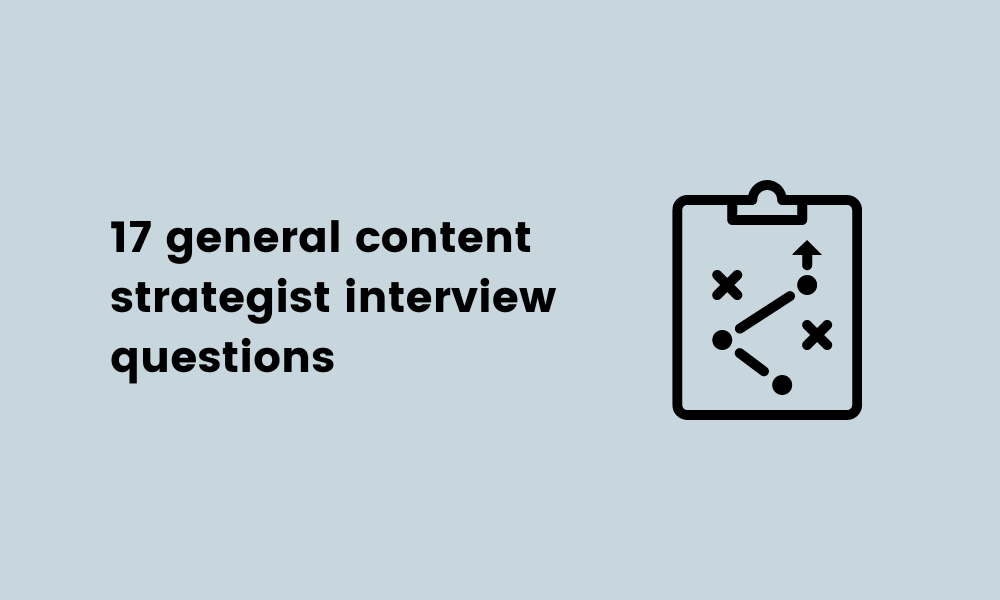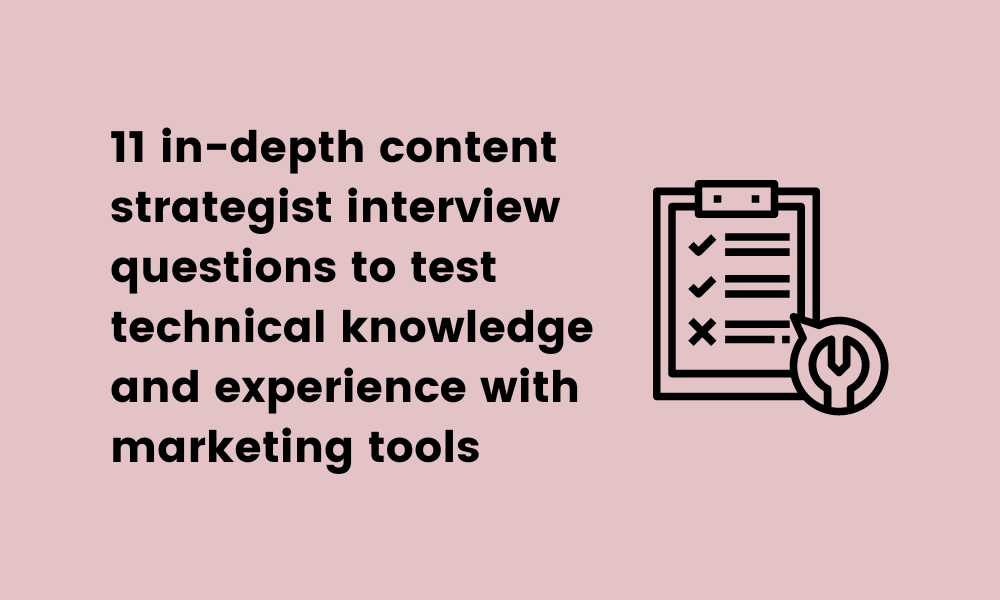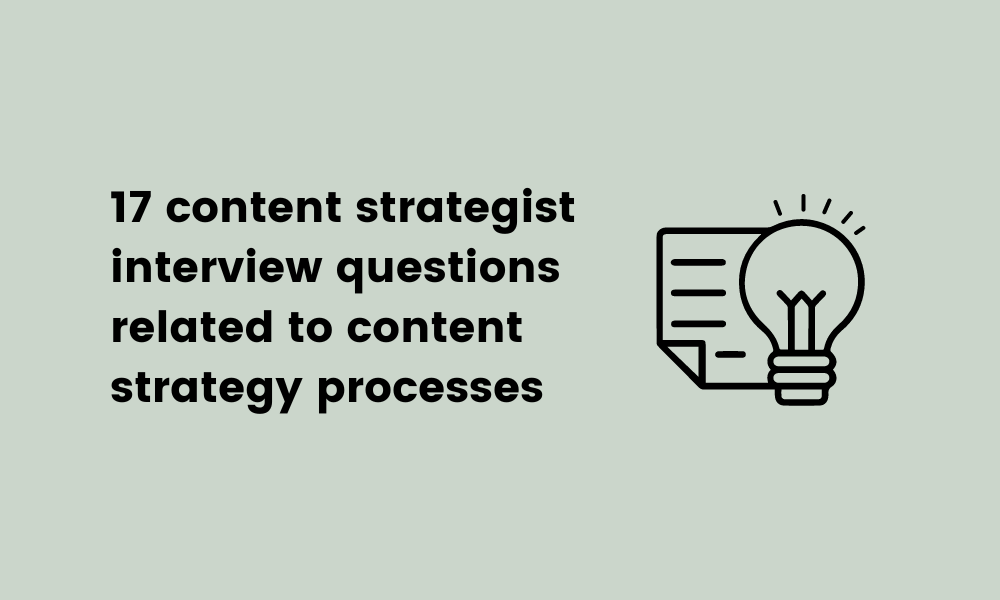45 content strategist interview questions
If you’re about to embark on your next hiring journey in search of a content strategist, you’re already aware that you have to ensure they know the ins and outs of content strategy and have the right skills for the role.
Interviewing applicants and conducting rounds of interviews is a tried and tested method that you can pair with skills testing to evaluate your applicants’ qualities.
That’s precisely what this article will help you with.
Here you’ll find 45 content strategist interview questions to help you interview your applicants and thoroughly assess their skills. And make sure you check out our Content Strategy test at TestGorilla to make the pre-selection process easier.
For now, let’s dive into the interview questions.
Table of contents
- 17 general content strategist interview questions
- 5 general content strategist interview questions and answers to assess applicants
- 11 in-depth content strategist interview questions to test technical knowledge and experience with marketing tools
- 5 in-depth content strategist interview questions and answers related to technical knowledge and marketing tools
- 17 content strategist interview questions related to content strategy processes
- 5 content strategist interview questions and answers related to processes
- Why and when should you use a content strategy test during the recruitment process?
- Hire a talented content strategist with the right content strategist interview questions
17 general content strategist interview questions
Ask interviewees some of these 17 general content strategist interview questions to assess their knowledge during interviews.
Why have you applied for our content strategist role?
Which responsibilities do you expect to take on in this role?
Which skills are you working on as a content strategist?
Which skills help content strategists to achieve company goals?
Which soft skills help content strategists deliver results?
What have been the most pressing challenges you encountered in your current or past role?
What is your day-to-day work routine like in your current role?
Describe your experience as a content strategist.
Which values and mindset are essential for a content strategist role?
Which methods do you use to motivate yourself as a content strategist?
Describe a time you made an error. What did you learn?
Describe your greatest achievement as a content strategist.
Do you have any content marketing qualifications?
Describe some projects you’ve worked on in the past.
Have you created content before? What types of content?
Describe your cross-team collaboration experience.
Which brands have been your inspiration when creating strategies?
5 general content strategist interview questions and answers to assess applicants
Assess your applicants’ responses to the five most critical general content strategist interview questions using the sample answers we’ve provided below.
1. Which skills are you working on as a content strategist?
Make sure your applicants have strategies to enhance their skills they can explain during the interview. They may mention that they’re working on their knowledge of technical SEO and SEO tools.
They may hope to improve their client or cross-team communication skills. Whatever the particular skills they mention, interviewees should show a passion for learning and growing professionally.
2. Which skills help content strategists to achieve company goals?
Are your applicants aware that technical SEO skills (which you can assess with our Technical SEO test) are vital for achieving company goals?
Do they know that copywriting and knowledge of analytics are also critical in helping organizations like yours increase conversions and achieve targets?
3. Which soft skills help content strategists deliver results?
Some of the crucial soft skills that content strategists may use to achieve company goals include collaboration and communication skills, as well as time management skills. You can evaluate these using our Communication and Time Management tests.
4. What were the most significant challenges you encountered in your current role?
In response to this question, applicants may list various challenges. They may have found it difficult to meet clients’ expectations or encountered problems communicating with clients. It’s essential to find out if your potential new hire has learned from these challenges and seeks to constantly improve when there are setbacks.
5. Describe your cross-team collaboration experience.
Since content strategists may work with graphic designers, an SEO team, a team of writers, and external clients, they must have the right cross-team collaboration experience.
Do they have the right communication and leadership skills (which you can assess with our Leadership and People Management test) necessary for efficient cross-team collaboration?
The best insights on HR and recruitment, delivered to your inbox.
Biweekly updates. No spam. Unsubscribe any time.
11 in-depth content strategist interview questions to test technical knowledge and experience with marketing tools
Ask applicants some of these 11 in-depth content strategist interview questions to evaluate your applicants’ technical knowledge and understanding of tools.
Name a content management system you have used in the past.
Name three examples of clients for whom you have created a content strategy.
Why is content auditing necessary?
What does brand alignment mean, and why is it important?
Why are tools like SEMrush necessary for content strategy work?
Explain in detail what a content brief is.
Explain in detail what keywords are.
How has the use of keywords in content strategy and writing changed over time?
Name three successful channels for distributing content.
How does posting on Twitter contribute to a brand’s goals? What is the platform suited for?
How does posting on LinkedIn contribute to a brand’s goals? What is the platform suited for?
5 in-depth content strategist interview questions and answers related to technical knowledge and marketing tools
Review your applicants’ answers to these five in-depth content strategist interview questions about tools and technical knowledge with the answers we’ve provided below.
1. How does posting on Twitter contribute to a brand’s goals? What is the platform suited for?
Your applicants should understand how each social media platform or channel works to use it to their clients’ advantage and promote their brands.
Are they aware that Twitter is an ideal platform for storytelling? Can they explain that Twitter is perfect for developing a brand’s narrative, including making subtle changes to it over time?
2. How does posting on LinkedIn contribute to a brand’s goals? What is the platform suited for?
Interviewees should be able to confidently explain how LinkedIn is essential for helping a brand achieve its goals.
Can they explain that LinkedIn is the best option for increasing connections and, in particular, promoting the company’s mailing list? Can they explain why LinkedIn is the preferred network for B2B businesses?
3. Explain in detail what a content brief is.
Skilled interviewees applying for a content strategist role with your organization should know what a content brief is.
Can they explain that a content brief is a document on which all the required information is provided for writers or marketers to create content? Can they also explain that content briefs are necessary for scaling content production and creating top-quality content consistently?
4. Explain in detail what keywords are.
Content strategists worth their salt should know what keywords are.
Can your potential next hire explain that keywords are topics or phrases that users use to find your content via search engines like Google or Bing? For this reason, keywords are critical for SEO and will inform your overall SEO and content strategy.
5. How has the use of keywords in content strategy and writing changed over time?
Expert content strategists should know that keyword strategies evolve with time based on changes in search engine algorithms.
For instance, while keywords were once used excessively, Google now penalizes content “stuffed” with keywords. Can your applicants explain that LSI (latent semantic indexing) keywords are now vital for content strategists?
17 content strategist interview questions related to content strategy processes
Ask your applicants some of these 17 content strategist interview questions about processes to learn how they approach complex tasks.
How would you conduct client customer research?
Which phases would you go through to build a top content strategy?
Which components would you include on a content-strategy checklist?
How would you manage complex content strategist tasks?
Which method would you use to communicate with your clients?
How would you enhance an inefficient content strategy?
How would you audit content that was written several months ago?
How would you determine which channels to use to distribute content?
How would you monitor the performance of your content strategy?
Describe your approach to management. How would you manage a team?
How would you stay up-to-date with the latest trends in the field of content strategy?
How would you extend the reach of our business’s social media posts?
How would you determine the best writing style for a piece of content?
Have you ever had to hire a new writer for your team? Which process did you use?
Which method would you use to develop short-term content plans for a client?
Which method would you use to develop long-term content plans for a client?
Which approaches would you use to ensure your content is SEO-friendly?
5 content strategist interview questions and answers related to processes
Evaluate your applicants’ responses to these five content strategist interview questions with the answers below.
1. Which approaches would you use to ensure your writers’ content is SEO-friendly?
Do your applicants know that a crucial approach for ensuring their writers’ content is SEO-friendly is to use tools such as SEMrush, SurferSEO, and Ahrefs?
Can they outline their experience using these tools and describe the success they have achieved with content as a result?
2. How would you stay up-to-date with the latest trends in the field of content strategy?
Applicants should constantly seek to stay up-to-date with new trends in their field. They may mention that they’re subscribed to blogs and newsletters related to digital content strategy and that they network with experts on social media to stay aware of current developments.
3. How would you monitor the performance of your content strategy?
Analytics tools can help content strategists effortlessly monitor the performance of their content strategy.
Expertise with tools such as HubSpot (which you can test with our HubSpot CRM test) can help your next content strategist monitor their strategy, so consider applicants who have experience with them.
Can your applicants mention a few analytics tools they have used previously to track the performance their teams have produced?
4. Which components would you include on a content-strategy checklist?
There are a few components that can contribute to a top content strategy. Some of the main components your applicants may list when responding to this question include:
Viral content
Pillar pages or skyscrapers
Content that is categorized as thought leadership
Content for pushing sales like landing pages
5. How would you conduct customer research?
Applicants may mention the following steps when describing how they conduct customer research:
Use the right tools for customer research in this particular field
Determine customer preferences
Create buyer personas
Research competitors
Design a customer success map
Establish metrics to assess the success of the strategy
Work toward customer engagement
Why and when should you use a content strategy test during the recruitment process?
Skills testing is an excellent strategy for hiring a content strategist for your team when executed correctly. It’s much faster to hire an applicant by making sure they have the right knowledge and content strategist skills by using skills tests.
Wondering when to use a Content Strategy test? Use it before interviews.
Consider the steps below to integrate the test in your hiring process:
Write your content strategist job description
Collect applications from content strategist candidates
Use a skills assessment featuring a Content Strategy test
Use our list of content strategist interview questions to prepare
Analyze the results of the assessment and invite your best candidates to an interview
Review all results (of skills tests and interviews)
Hire and onboard your new content strategist
Hire a talented content strategist with the right content strategist interview questions
With the information in this article, you’re all set to hire the best content strategist for your organization.
Yes, there are many skills you’ll need to consider. And yes, you may receive hundreds of applicants. But guess what?
Skill testing and the right content-strategy interview questions are great methods to help you identify your most skilled, promising applicants who will help your organization achieve the best results.
After our Content Strategy test, use these content strategist interview questions from this article to hire an expert and watch your business achieve its marketing goals.
Sign up for TestGorilla to get access to the Content Strategy test and hundreds of other expert-developed pre-employment tests.
You've scrolled this far
Why not try TestGorilla for free, and see what happens when you put skills first.





















